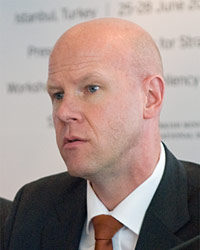Istanbul '09 Workshop
NATO’s New Strategic Concept, the Economic Crises, And Implications for Industry
Mr. Thomas Homberg
Corporate Vice President, Head of Strategic Coordination, EADS
I am going to focus on two points: First, how we envisage the new NATO Strategic Concept and its consequences for interaction between governments, non-governmental organizations, and industry; and second, the economic crisis that is impacting industries and governments and their ability to prepare for the future.
THE NEW NATO CONCEPT AND ITS IMPLICATIONS FOR INDUSTRY
The new concept will be based on the pillar of cooperation between civil actors, military actors, and security actors following the principles of networked security. Thus, three levels of cooperation need to be addressed now.
1. Cooperation within the industrial sector. Our defense industry today is too fragmented and our focus is still very nationalistic. One figure taken from a European Defense Agency analysis illustrates our inefficiency: approximately 80% of Europe’s total defense research and technology budget is spent to meet purely national aims. We must systematically favor cooperative programs over exclusively nationalistic industrial approaches which cause unsustainable redundancies and duplications without sufficiently supporting interoperability between defense, security, and civil actors in line with what I believe are the prerequisites and requirements of the new NATO concept.
As a consequence, my first request is this: Let us spend more cleverly. Let us:
- Harmonize and prioritize government demands and investments in defense and security to support industrial rationalization;
- Better coordinate and fund research investments; and
- Launch cooperative European and transatlantic programs rather than national ones.
2. Cooperation between defense, security, and civil players in operations. All military operations abroad will someday include a police and civil infrastructure development component with interoperability requirements. All parties engaged in a theatre, from defense or security forces to civil agencies, undoubtedly have their particular specialties. However, due to the convergence of needs when operating in the same environment and in line with the new NATO concept, together we must increase these players’ interoperability whilst considering their ConOps, employment in theatre, equipment, and training.
As a consequence, my second request is to further strengthen cooperation between defense, security, and civil forces, supported by industry. This includes:
- Ensuring cross-fertilization between security and defense forces and, to a lesser extent and if applicable, with civil players in both training and operations;
- Systematically sharing lessons learned, and including industry in this exchange;
- Developing dual-use equipment to make the best use of common standards, procedures, and logistics in operations;
- Fostering dual-use equipment to maximize economic benefits in research, development, and procurement.
3. Cooperation between defense and security forces, governmental and non-governmental actors, and industry. We need a straightforward, honest, and constructive dialogue between industry and the customer base through a multidisciplinary approach involving all actors. With such an approach, certain requirements will gain importance in light of the economic crisis and its effects:
- Refrain from over-customization and over-specification which result in overly complex programs and high risks, including cost overruns and delays;
- Ensure, consequently, faster and more cost-efficient development and production cycles;
- Support these shorter cycles by providing industrial partners with privileged access to defense and security planners, concepts, and lessons learned; and
- Increase the exchange of personnel to facilitate this access and ensure joint training for all actors, including industry.
THE ECONOMIC CRISIS AND ITS IMPACT
The world faces increasingly complex global security challenges and threats which include international terrorism, pandemics, climate change, energy security, cyber security, and a severe global economic crisis at the same time. Thus the new NATO Strategic Concept is introduced in a very challenging environment. Because of the crisis, it will be difficult for some countries to maintain their level of spending for defense and security.
Governments can take two possible actions in times of economic crisis, but only one is attractive to us.
- This crisis could be an accelerating factor that could strongly encourage nations to increase cooperation in order to efficiently manage limited resources.
- On the other side, the crisis could cause a protectionist reflex where governments move to protect national interests first, not favoring European and transatlantic cooperation.
To me the choice is obvious: separate national approaches will fall short of the target because they a) contradict our interoperability requirements, and b) ignore the need for industrial and financial rationalization in times of limited resources. Instead, new European and transatlantic collaboration approaches are needed.
CONCLUDING REMARKS
To summarize:
- The new NATO concept is launched at a time when new security threats are materializing alongside serious economic challenges.
- We therefore must overcome national protectionist reflexes and instead strengthen cooperation to share capabilities at both the European and transatlantic levels.
- The new NATO can act as a true accelerator for strengthened cooperation. However, vice-versa, it will take cooperation to make the new concept a success and to ultimately serve all those in the field and in theatre.

